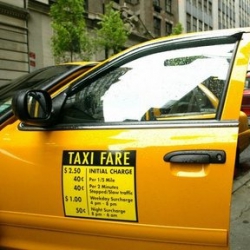A New Jersey man who pulled a knife on a cab driver says his crimes was motivated by the need to pay a gambling debt. Michael Ruocco of Matawan, New Jersey is alleged to have pulled a knife on a New Jersey cab driven, telling the man, “I need to kill somebody today.”
The crime took place on Staten Island. Mr. Ruocco is thought to have stolen $502 from the cabbie, before getting away on foot. When police answered a criminal complaint against the man, he confessed to the robbery. The man’s crimes appear to have been without a great deal of foresight.
Michael Ruocco Pulls a Knife
Francisco Batista, owner of the cab company which was targeted, says his driver picked up Ruocco in New Jersey, then drove him to Staten Island. Once on Staten Island, the driver was told to stop outside a home, where he presumably would pick up Ruocco’s daughter.
As they were waiting, no one came out of the house. Ruocco told the cab driver to pull forward and, as they were driving away from the house, Ruocco put a knife to the driver’s neck.
Police Led to Ruocco’s Home
After giving the man the money, the cab driver ran on foot away from the scene. Of course, driver knew the man’s home address and the presumed home of the man’s daughter. When the police arrived at Michael Ruocco’s home to answer the criminal complaint, he confessed to the crime.
Defendant’s Admission of Guilt
According to the crime report, the 23 year old assailant said, “I called a cab company in New Jersey. When I got to Staten, it came to me head to tell him to give me his money. I had a debt with somebody over gambling and felt I had no choice but to do what I did.”
First Degree Robbery and Carjacking
A statement released from Richmond County District Attorney Daniel Donovan’s office, Michael Ruocco was arraigned on a first-degree robbery charge, along with other charges. First degree robbery refers to a crime in which you are armed at the time or the act. It can also be invoked if a criminal inflicts or attempts to inflict serious bodily injury. Described as “a very serious charge”, in New Jersey a conviction of first-degree robbery carries a potential 10 to 20 years in prison.
Carjacking is another serious crime, as it carries a potential 30 year sentence in prison. In New Jersey, carjacking carries with it a mandatory 5-year sentence in jail. It is unknown how much money Michael Ruocco owes in gambling debts.
Problem Gamblers and Desperate Acts
Often, problem gamblers try to cover their debts with risky behavior, which sometimes involves crimes which carry significant prison sentences. The acts perpetrated over the years to pay off gaming debts involves a wide spectrum of crimes. Company executives and government bureaucrats have committed white collar crimes. A woman in New Jersey last month was arrested for claiming an identity thief had created an online gambling profile, then lost $10,000 while gambling in her name.
Henry Kavasas, an Australian real estate mogul, once sued the Crown Melbourne for $1 billion, claiming he lost $1.5 billion while gambling at Australia’s biggest casino. Like many others before him, Kavasas lost everything, including the court case. Gaming debts lead people to rash and dangerous actions, so gamblers would be wise to avoid spiraling debts. If these happen, the worst one can do is turn to crime to pay off the money owed.
In the case of the 23 year old Michael Ruocco, he is likely to spend his young daughter’s childhood in prison, because he tried to steal money to pay debts in a moment of rashness. Such men often see no other way. Whether it’s through legitimate bank loans or sleazy payday loans, any legal way to subsidize paying one’s gambling debts is better than turning to violent crimes–or any crimes at all.
Often, a person prone to the rashness of compulsive gambling is often going to display rashness in other areas of their life. When a crime is committed in order to settle gambling debts, gambling is often blamed for the person’s fall. In many, yet not all, cases, the person involved likely would have found other ways to get themselves into trouble.

